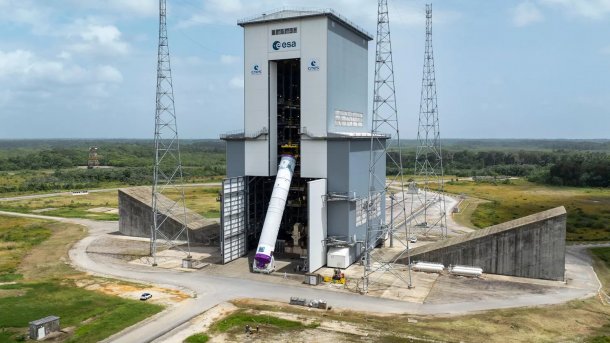Before Ariane 6's maiden flight: rocket assembly starts on launch pad
Europe's new launch vehicle is due to take off for the first time in early summer, and the expectations are immense. Now assembly has begun on the launch pad.

Construction of the main stage
(Image: Arianespace)
At the European spaceport in Kourou, French Guiana, assembly has begun on the Ariane 6, which is due to make its maiden flight for Europe's new launch vehicle in early summer. The parties involved have now made this public and explained that last week the central body of the rocket was brought to the launch pad first, followed later by the two boosters. After the three parts have been joined together, the next step is to complete the final inspection of the rocket and its launch system, explains manufacturer Arianespace. Only when this has been completed with a positive result will the payload be installed. The Ariane 6 flight model 1 is then scheduled to take off between June 15 and July 31.
Great expectations in Europe
Before assembly of the rocket begins, the last so-called hot run test of the upper stage was carried out on a test stand at the German Aerospace Center on April 12. According to Arianespace, the main focus was on its behavior under abnormal operating conditions. The three-part test lasted a total of 66 minutes and was completed successfully. This paved the way for entry into the final phase before the maiden flight, added the European Space Agency ESA. Thanks to the "hard work" at ESA, ArianeGroup and France's space agency CNES, Europe is on the verge of regaining sovereign access to space. Regaining this access is a top priority, confirms ESA CEO Josef Aschbacher.
Ariane 6 is the successor to Ariane 5, which has been in use since 1996 and has now completed its last launch. Work on the rocket has been delayed due to the coronavirus pandemic, among other things. But even after the end of the pandemic, the schedules could not be adhered to. A year and a half ago, it was said that the first launch of an Ariane 6 would take place in April 2023 at the earliest, but this did not work out. At the beginning of August, the ESA then admitted that it would not work out in 2023 either. The delay in commissioning has plunged Europe's space industry into a crisis and this will only end when the new rocket lifts off reliably and at the desired rate.
(mho)